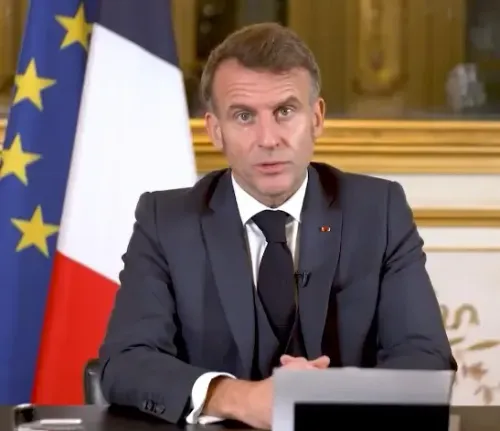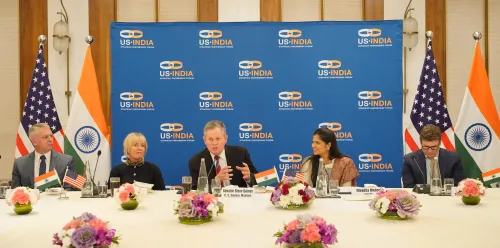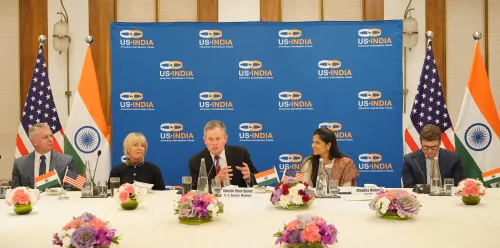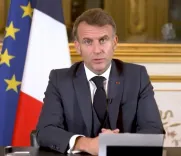What Insights Did the Indian Navy Chief Share on Global Maritime Challenges and Geopolitics?
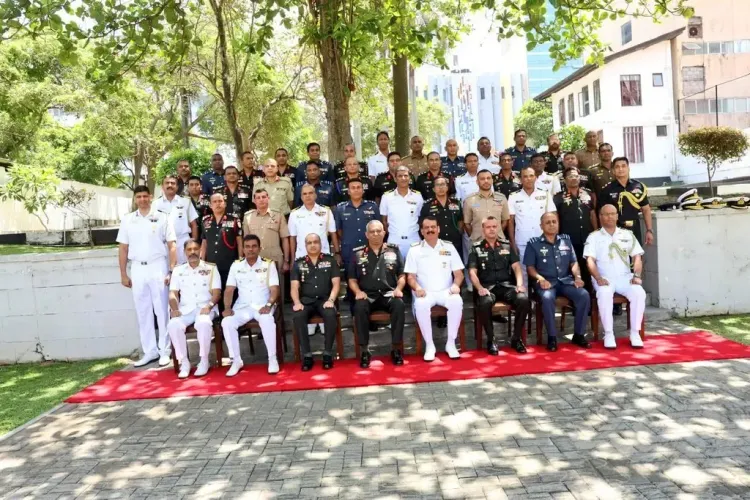
Synopsis
Key Takeaways
- Deep historical, cultural, and strategic ties between India and Sri Lanka.
- Importance of maritime security for both nations.
- Technological innovation as a key driver in naval operations.
- Collaborative platforms like Goa Maritime Symposium and SLINEX enhance cooperation.
- Commitment to regional peace and stability in the Indian Ocean Region.
Colombo, Sep 24 (NationPress) The Chief of the Naval Staff (CNS), Admiral Dinesh K Tripathi, delivered a keynote address at the National Defence College in Colombo on Wednesday, emphasizing the profound historical, cultural, and strategic connections that unite India and Sri Lanka within the Indian Ocean Region.
During his address, Admiral Tripathi reinforced the significance of the seas for both nations' economic and strategic security. He highlighted the importance of initiatives like the Goa Maritime Symposium and SLINEX in boosting collaborative competencies while acknowledging the role of technology in driving Green Initiatives and innovation.
In a tweet, the spokesperson for the Indian Navy stated, "Adm Dinesh K Tripathi, CNS, spoke to the attendees of the National Defence College, #Colombo on #23Sep, underlining the deep historical, cultural, and strategic connections between India and Sri Lanka in the #IndianOceanRegion. Reflecting on global maritime challenges, including shifting geopolitics, rapid technological advancements, and grey-zone tactics, the CNS outlined three key imperatives: credible capability, enhanced cooperation, and technological evolution."
"He emphasized that both countries rely on the oceans for their economic and strategic security, citing successful examples of naval collaboration such as joint operations in anti-piracy rescues and narcotics interdiction. The CNS also acknowledged the significance of platforms like the Goa Maritime Symposium and SLINEX in fostering shared competence, while highlighting the role of technology in Green Initiatives and encouraging innovation. He urged future leaders to remain agile, people-centric, and collaborative, reaffirming India’s commitment to Sri Lanka and a secure, prosperous Indian Ocean Region," the spokesperson added.
Earlier in the day, Admiral Tripathi hosted a Deck Reception aboard the Indian Navy's stealth frigate INS Satpura in Colombo, further cementing the deep maritime and cultural ties between the two nations. Sri Lanka's Minister of Justice and National Integration, Harshana Nanayakkara, attended the reception as the chief guest.
"Adm Dinesh K Tripathi, #CNS, during his official visit to #SriLanka, hosted a Deck Reception aboard the #IndianNavy's stealth frigate INS Satpura at Colombo, reaffirming the strong maritime and cultural connections between India and Sri Lanka. The event was honored by Hon. Harshana Nanayakkara, Minister of Justice and National Integration of Sri Lanka, as the Chief Guest, along with Mr. Santosh Jha, the High Commissioner of India to Sri Lanka. The reception celebrated shared values of friendship, trust, and cooperation while underscoring the commitment of both nations to regional peace, stability, and security, thereby strengthening the enduring India-Sri Lanka bond," the Indian Navy posted on X.
Admiral Tripathi also engaged in extensive discussions with Sri Lankan Prime Minister Harini Amarasuriya in Colombo. Arriving on Tuesday for a four-day visit, he met with the Sri Lankan PM to discuss maritime security, training, and capacity building.
A post from the Indian Navy spokesperson revealed, "The discussions covered a wide range of topics related to the enduring partnership between India and Sri Lanka in the maritime domain, reaffirming the commitment to strengthening bilateral defense cooperation through enhanced operational engagements, capacity-building initiatives, and participation in multilateral forums such as the International Fleet Review, MILAN, and the Admiral's Cup Regatta."
According to the statement, Prime Minister Amarasuriya "highlighted the strategic importance of the ocean for maritime nations and emphasized the necessity of collective efforts to protect this common resource." She also pointed out the potential for deeper collaboration in addressing transnational challenges such as anti-narcotics operations, illegal, unreported, and unregulated fishing, marine pollution, and maritime terrorism.
The meeting reflected the "shared vision" of both nations to "promote peace, stability, and sustainable development in the Indian Ocean Region through mutual trust and cooperation."


